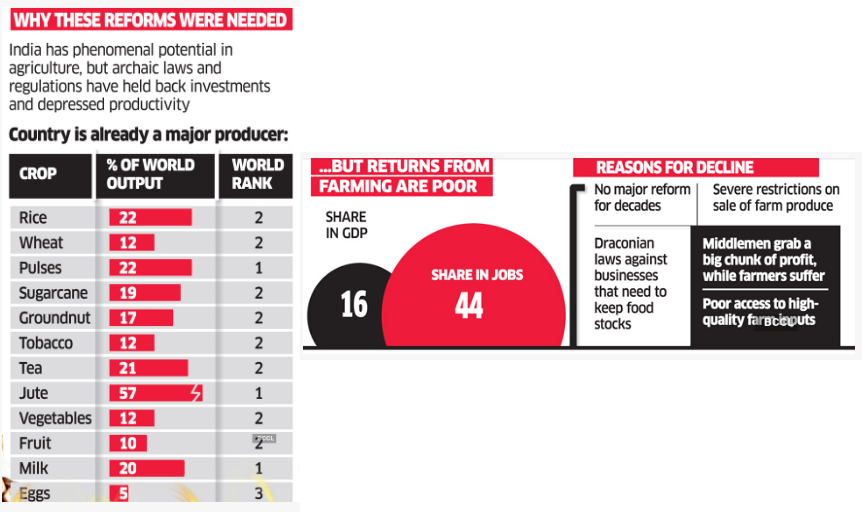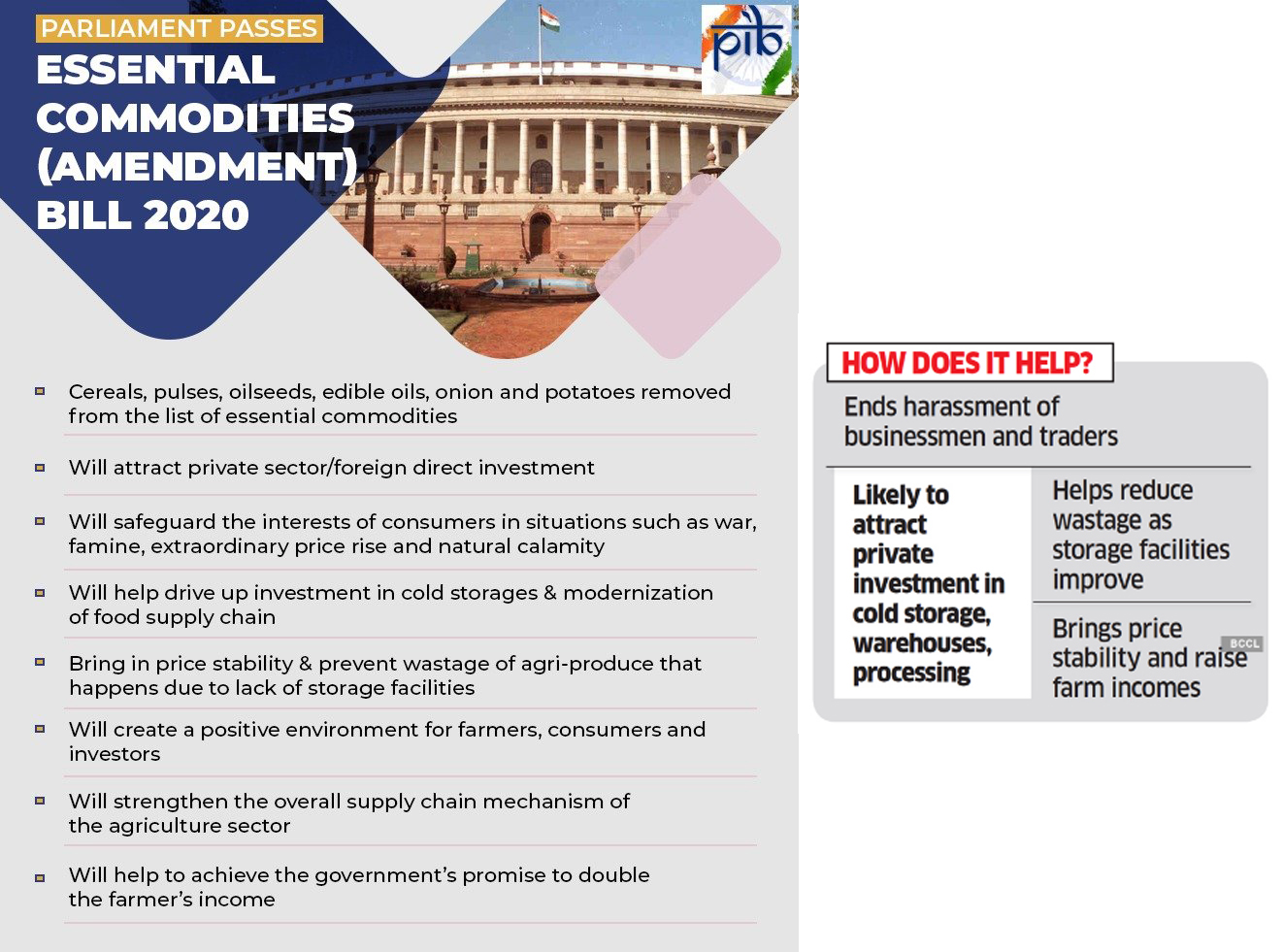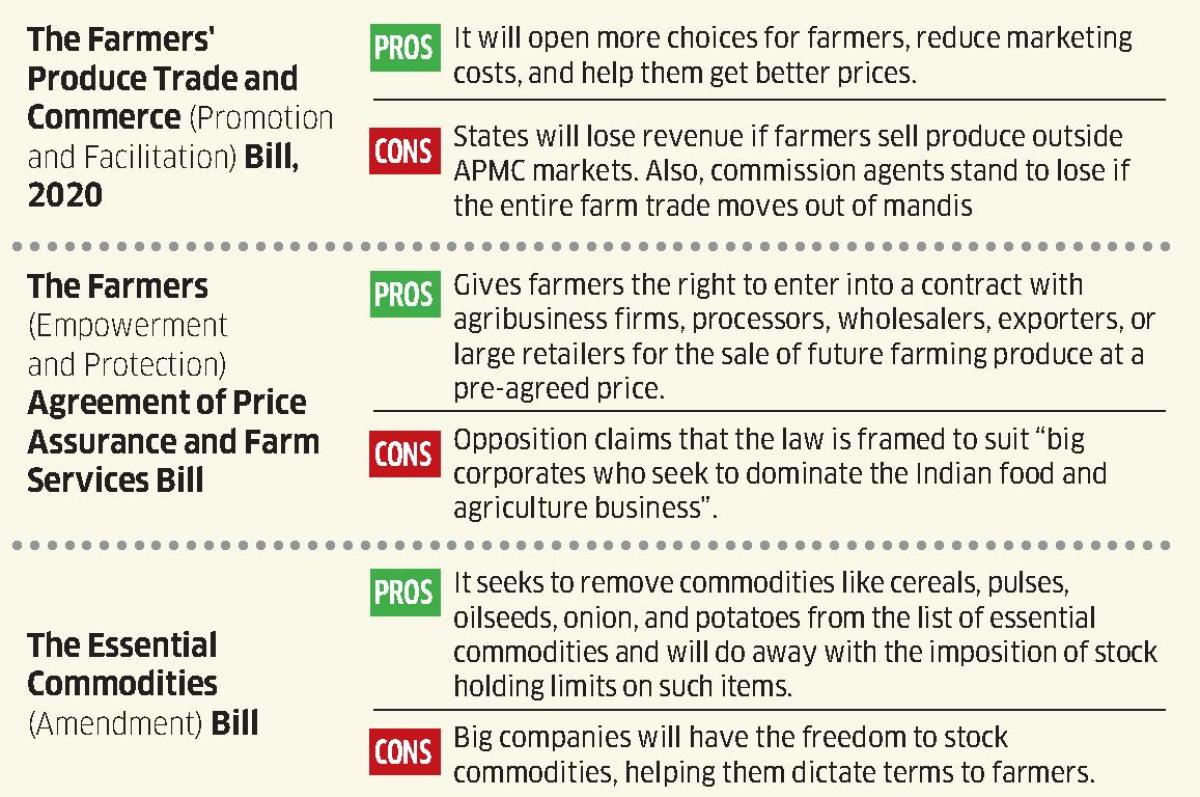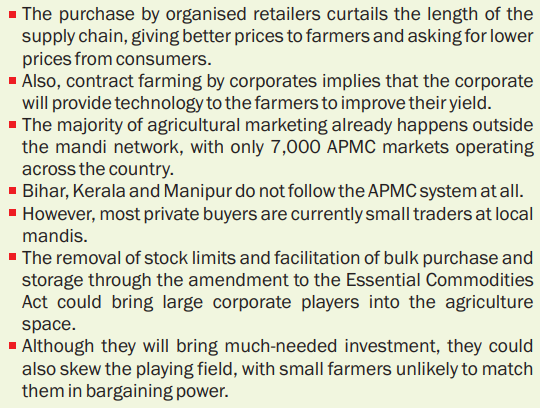




Thousands of farmers have been protesting at Delhi's borders over the three farm bills passed by Parliament this year. They are demanding that the three new farm laws should be withdrawn by the government.
On 27 September 2020, President Ram Nath Kovind gave his assent to the three 'Agriculture Bills' that were earlier passed by the Indian Parliament.
Agriculture employs 58% of India’s population and contributes to 15% of GDP. In 2020 the sector has grown by 4%.
Despite this, for decades, millions of India’s small and marginal farmers have been living in abject poverty due to a cocktail of problems that exist in the country’s tightly controlled agriculture sector.
The major being - APMC MONOPOLY & MIDDLEMEN
The erstwhile provision that agricultural produce can only be marketed at the APMCs cause a monopoly of market players/ middlemen.
The produce passes on to wholesalers in the city, who in turn sell it to small retailers or peddlers. There is a price rise of Rs 4 to 5 at every tranche. The result is that vegetables, which are purchased at Rs 2 or 3 a kg from farmers are sold at Rs 20 to 30 a kilo to urban consumers.
Thus, crores of urban Indians pay higher prices and millions of farmers have gone underpaid. Further, millions of farmers who are situated far away from cities can't travel because of higher costs of transportation.
To put it simply, over-interference of middlemen and weak agricultural infrastructure have punctured India’s agricultural sector growth and pushed the country’s poorest farmers into a pool of debt.
To remove these loopholes the new Farmers bill has been passed by the government.

'APMCs Are Hotbed Of Politics, Corruption, Monopoly. They Are Not Working In The Interest Of Farmers' : Parliament Panel on Agriculture.
Farmer’s Produce Trade and Commerce (Promotion and Facilitation) Bill, 2020
This bill allows farmers to engage in trade of their agricultural produce outside the physical markets notified under various state Agricultural Produce Marketing Committee laws (APMC acts). Also known as the ‘APMC Bypass Bill’, it will override all the state-level APMC acts.

Farmers (Empowerment and Protection) Agreement of Price Assurance and Farm Services Bill, 2020
The bill seeks to provide farmers with a framework to engage in contract farming, where farmers can enter into a direct agreement with a buyer (before sowing season) to sell the produce to them at pre-determined prices.

Farmers (Empowerment and Protection) Agreement of Price Assurance and Farm Services Bill, 2020
The bill seeks to provide farmers with a framework to engage in contract farming, where farmers can enter into a direct agreement with a buyer (before sowing season) to sell the produce to them at pre-determined prices.

Corporatisation of agriculture
The Farmers’ Produce Trade and Commerce (Promotion and Facilitation) Act, 2020 liberates farmers by giving them the freedom to sell anywhere.
A host of entities including corporates, traders and even the end customer can procure from farmers without a licence or payment of fee, unlike in the APMC structure.
This opens up the floodgates to corporates who can directly procure from farmers without the interference of middlemen.
Protesters say this would lead to corporatisation of agriculture, with the market.
Lack of regulation in non-APMC markets
Farmers are apprehensive that the new laws give the preference for corporate interests at the cost of farmers’ interests.
Since there is a lack of regulation in non-APMC markets, the farmers might find it difficult to strike deals with Corporates, as the big corporate houses operate solely on the motive of profit seeking.
Loss of State’s Revenue
In Punjab and Haryana, the epicentre of the protests, the market fee, rural development fee, and arhatiya’s (commission agents) commission are 3%, 3%, and 2.5%; and 2%, 2%, and 2.5% respectively.
States like Punjab and Haryana are also most invested in the APMC system, with a strong mandi network, a well-oiled system of arhatiyas or commission agents facilitating procurement.
The Punjab government charges a 6% mandi tax (along with a 2.5% fee for handling central procurement) and earns annual revenue of about Rs 3,500 crore from these charges.
Deregulation of the agricultural market mechanism — will reduce their price security net of this network.
Threat to MSPs
There are fears that under the new laws Procurement at Minimum Support Price will stop if farm produce is sold outside APMC mandis. And without MSPs, market prices will fall.

The Question of Federalism
At the heart of the case is the assertion that the centre has encroached upon the domain of states. Agriculture is a subject over which states have exclusive jurisdiction and the protesters say that the centre had no power to introduce and pass laws on it in Parliament.
|
Counter argument -- Agriculture, land and market are ‘state’ subjects but in pith and substance, the farm laws do not deal with those subjects at all. The “doctrine of pith and substance” is used by courts while interpreting laws which may appear to be falling under different lists. The court examines the law passed by the Parliament as a whole and if, in substance, it deals with a subject in the Union or Concurrent list, then it passes muster. In the case of farm laws, the Parliament derives its ability to legislate from entry 33 in the Concurrent List. This allows the central government to pass laws relating to trade, commerce, production, supply, distribution of any product in an industry. |
Other concerns


|
Lessons from Bihar APMC mandis are well known for their excessive politicization, which has resulted in cartelization and price fixing. Precisely for this reason, there have been several attempts at reforming their functioning. Easier licensing norms, the removal of entry and exit barriers and computerization and transparency have been introduced in most APMC markets. However, the Bihar government decided to abolish the APMC system altogether in 2006. Critics of the APMC system had promised that its abolition would ensure better prices for farmers of the state. It would attract large sums of private investment in its market infrastructure, something the current reforms also promise. However, with no revenue to maintain agri infrastructure in Bihar is now in a dilapidated condition. Also, no major private investment has come in. |

Allay farmers’ apprehensions
The Government needs to build consensus by taking all the stakeholders on board by explaining to them the need for reform.
Swift grievance redressal mechanism
The farmers’ should be provided with a swift grievance redressal mechanism to prevent exploitation by corporate houses or big farmers. There should be speedy government response to issues.
Revamp Agricultural Infrastructure
Government should revamp and bring reforms in the existing market system, in order to remove trade cartels and corruption. This is because corruption can creep in the form of Corporate agents and middlemen in the new system as well if poor farmers fail to strike fair deals with corporate houses.
This can be done by empowering State Farmers Commissions or SFCs.
Bolstering Competition
In order to double farmers’ income, the small and marginalized farmers need to be empowered with logistical and infrastructural support. Also, the single National Agricultural Market needs to be strengthened on war footing so that it can be taken to the farmer at the very last mile through digitalization, awareness and capacity building.
“Agriculture is our wisest pursuit, because it will in the End
Contribute most to real wealth, good morals and happiness”
-Thomas Jefferson
© 2025 iasgyan. All right reserved